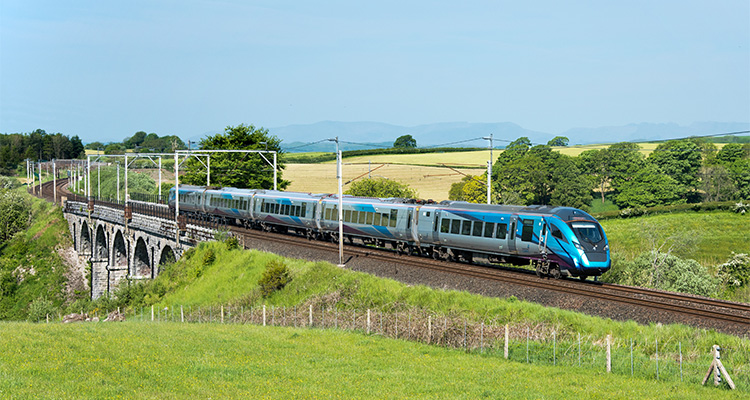TransPennine Express is delivering on its impressive plans to provide a more reliable, punctual and dependable rail service
We’ve recently marked our second-year anniversary,” Chris Jackson, Managing Director shares. “On the 28th of May 2023, TransPennine Express came into public ownership and I assumed my current position as Managing Director of the business. It’s no secret that TransPennine has had a bit of a turbulent past, which is why the previous government made the difficult decision to move us into public ownership. As a business, we directly employ approximately 1900 people and that extends to around 2500 when you consider our wider supply chain partners. We run around 320 train services a day and are expected to deliver 30.6 million passenger journeys this year. As it stands, we are the fastest growing train operating company in the UK, which shows what you can do when you stabilize performance.”

TransPennine now has plans in place to deliver a more reliable, punctual and dependable service across the towns and cities it connects. After a challenging few years, the plan sets out the steps the company’s taking to make journeys better for all its customers. To deliver this, the plan focuses on three phases: stabilizing operations to deliver better reliability and punctuality, re-engaging with passengers, and transforming the network. Through each of these, TransPennine will be making changes to simplify its business to ensure trains run on time, providing the best possible journey experience in its stations and on its trains.
“We’ve made great tracks over the past couple of years,” Chris continues. “We’re critical to the northern economy and cover train services across the North and into Scotland through three distinct routes: the Anglo-Scottish services, which cover Manchester or Liverpool to Preston, Carlisle and Glasgow, as well as Edinburgh for the Manchester line; the North Route services, which cover Manchester or Liverpool through to Huddersfield, Leeds, York, Hull, Scarborough, Saltburn, Newcastle and on to Edinburgh; and the third route is the South Route service which covers Manchester or Liverpool to Stockport, Sheffield and Cleethorpes.
“We inherited a business that had been through quite a lot of turbulence. Evidently, colleague engagement was quite low, so, it was important to get across the issues that the business was facing, develop a plan, stabilize it and re-engage our customers, colleagues and importantly, our trade union partners. Our aim was to develop a plan to fix the business in the long term, and we’ve done that. We temporarily stepped back the timetable in December 2023 and cleared a significant backlog of driver training. From December 2024, we reinstated our services and introduced new routes across the network, notably Castleford into York. This is the first time since 1970 that those towns have been connected directly with a new hourly service. That’s meant a 13 percent increase in the number of daily available seats. It’s boosted capacity and overall, cancellations have been reduced by 75 percent. We’ve seen a 42 percent growth in customer journeys and a 54 percent growth in revenue. Additionally, an important point to make is that we are a good value investment. For every £1 of public subsidy, £8 is generated in a wider economic return. When we get it right, and we’re increasingly getting it right, TransPennine is a great engine for economic growth in the North of England and Scotland.”
Looking ahead to future travel with TransPennine, the company will be unlocking the benefits of rail in the North by supporting the delivery of the TransPennine Route Upgrade (TRU) and other network improvement projects. The TRU will facilitate the introduction of a new fleet of greener, faster trains, meaning that when passengers travel by TransPennine, they are choosing a more environmentally friendly way to travel. This will create faster journeys, with trains operating at up to 125mph between Manchester and York. This will also facilitate the delivery of Northern Powerhouse Rail and other projects for the North, providing economic growth for the regions in which TransPennine’s customers live and work, as well as increasing freight as part of government targets.
“We’re heavily embedded within everything that’s going on with the TRU,” Chris elaborates. “It’s not just an infrastructure program, it’s a program that involves train operators and we have an important part to play to make sure that we keep customers informed and moving as much as possible. Inevitably, there will be rail replacement bus operations at times, but we’re doing our best to minimize that. I’m pleased to say that from July 2025, we have been operating three trains per hour on diversionary routes between Manchester and West Yorkshire, which is critical to ensuring we have sufficient capacity to meet the demand.
“There will be new infrastructure; stations will become step free and four will be completely rebuilt. We’re planning around the construction work and £100 million has already been invested in diversionary routes to make sure that we can operate the frequency of service at the right capacity. So far, the partnership has worked well and is a great model for how different parties can come together and operate as one with customers’ interests at heart. 
“Our net-zero ambitions and decarbonization strategy are intrinsically linked with the TRU. The whole route is going to be electrified and new digital signaling will also be installed, which will help us to achieve our goals. As part of our wider decarbonization strategy to deliver our non-traction carbon reduction targets we will deliver energy efficiency improvements and carbon reduction projects on a rolling program across our managed stations,” Chris explains.
Indeed, TransPennine is raising the bar in rail travel, putting customers first and helping build better infrastructure for the future of the regions it connects. The company’s vision in a nutshell is to work to create a better-connected network for everyone in the North and Scotland, for good. “We’ve seen a massive increase in colleague engagement,” Chris adds. “We’re up to 77 percent from 34 percent, according to our surveys. We are doing a lot of things well, but we know we still have much more to do to fully turn this around. We’ve launched a brand-new catering offer on a couple of our routes. One is on the West Coast Main Line between Manchester Airport and Liverpool and that’s been well received by customers. It’s also generating much more employment in towns and cities like Carlisle. We’ve just expanded that initiative on our service group between Liverpool and Newcastle as well and we have achieved some record-breaking customer advocacy scores. I’m proud to say that we’ve also made great strides in our diversity and inclusion efforts and have rebranded one of our trains as the Unity to demonstrate our commitment to that goal.
“I also believe we should be encouraging more women into the sector as well. We currently have a 24 percent representation, which believe it or not, is quite good for the industry, but we need to do so much more for women and other underrepresented groups and are making efforts to do so.
“In terms of our customers, our biggest priorities moving forward are safety and reliability. We operate on a congested network with other train operators, so if something goes wrong in one part of the network, it sometimes incurs delays elsewhere. We strive to work in partnership with Network Rail and other operators to not only reduce the number of incidents in the first instance but also the impact of those incidents. Another of my priorities is to continue improving things for our customers and colleagues. If you invest in your colleagues, they will, in turn, do the right thing for our customers.
“Many years ago, TransPennine was an award-winning business. Now that we’re coming out of some turbulent times, have stabilized, and are performing, we have a plan in place for continuous improvement. I’m confident that we will return this business to the award-winning ways of the past and I’m delighted to say that only a couple of weeks ago we won the Employer of the Year award at the Women in Rail Awards, which shows just how far we’ve come. As the fastest growing train operating company nationally over the last 12 months, we’re proof of what can be done,” he concludes. “There’s a great deal of demand and with the new trains rolling out, ensuring faster, greener and more frequent services, there’ll be greater capacity to connect people to the opportunities in their communities.”
